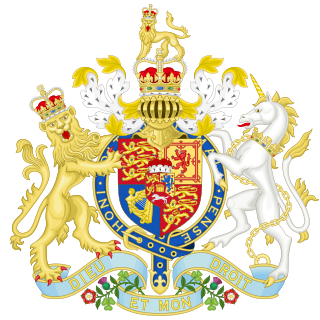
The Statute of Frauds (1677) was an act of the Parliament of England. It required that certain types of contracts, wills, and grants, and assignment or surrender of leases or interest in real property must be in writing and signed to avoid fraud on the court by perjury and subornation of perjury. It also required that documents of the courts be signed and dated.

The Wales and Berwick Act 1746 was an Act of the Parliament of Great Britain that created a statutory definition of England as including England, Wales and Berwick-upon-Tweed.

The British Museum Act 1753 was an act of the Parliament of Great Britain. The act provided for the purchase of the Museum or Collection of Sir Hans Sloane and of the Harleian Collection of Manuscripts to be held in a new body, the British Museum.

The Treason Act 1551 was an Act of the Parliament of England.

The Treason (Ireland) Act 1821 is an Act of the Parliament of the United Kingdom. It extended most of the English Treason Act 1695 to Ireland. Previously the 1695 Act only applied to England and Scotland.

The Short Titles Act 1896 is an Act of the Parliament of the United Kingdom. It replaces the Short Titles Act 1892.

The Statute Law Revision Act 1948 is an Act of the Parliament of the United Kingdom.

The Statute of Frauds Amendment Act 1828, commonly known as Lord Tenterden's Act, was an Act of the Parliament of the United Kingdom. Lord Tenterden served as Lord Chief Justice of the King's Bench between 1818 and 1832. Its purpose was for "rendering a written Memorandum necessary to the Validity of certain Promises and Engagements".

The Forgery Act 1837 was an Act of the Parliament of the United Kingdom. It was one of the Acts for the Mitigation of the Criminal Law passed during the session 7 Will. 4 & 1 Vict.

The Forgery Act 1870 is an Act of the Parliament of the United Kingdom. The whole Act, so far as unrepealed, was repealed by section 33(3) of, and Part I of Schedule 3 to, the Theft Act 1968. This Act was repealed for the Republic of Ireland by sections 1 and 2 of, and Part 4 of the Schedule to, the Statute Law Revision (Pre-1922) Act 2005.

The Treason Outlawries (Scotland) Act 1748 was an Act of the Parliament of Great Britain which applied only to Scotland. Its long title was "An Act to ascertain and establish the Method of Proceeding to and upon Outlawries for High Treason and Misprision of High Treason, in Scotland."
Irish fisheries law is the fisheries law of Ireland. It relates to Irish fisheries.

The Commons Act 1285 was an Act of the Parliament of England. It was chapter 46 of the Statute of Westminster the Second.

The Ordination of Ministers Act 1571 was an Act of the Parliament of England. Its principal provision was to require clergy of the Church of England to subscribe to the Thirty-Nine Articles of Religion.

The City of London Militia Act 1662 or Militia Act 1662 is an Act of the Parliament of England which codified the power of [lord-]lieutenants of places in England and Wales to raise the militia. In practice, most lieutenancy areas were counties, but the 1662 act made exemptions for the Constable of the Tower and Lord Warden of the Cinque Ports to act as lieutenants within their jurisdictions. Most provisions of the 1662 act were implicitly repealed by subsequent Militia Acts, and the whole act was explicitly repealed by the Statute Law Revision Act 1863 except in relation to the City of London, Tower Hamlets, and Cinque Ports. The Territorial Army and Militia Act 1921 repealed the whole act except for section 1 in relation to the Lord Lieutenant of the City of London and section 26 in relation to levying rates for the City of London Militia. The restricted scope of its remaining provisions was reflected in the official short title City of London Militia Act 1662 assigned in 1948. Section 1 was repealed by the Reserve Forces Act 1980, while as of 2023 section 26 as amended remains in force in England and Wales.

The New Forest Act 1800 was an Act of the Parliament of Great Britain.

The Duchy of Lancaster Act 1812 is an Act of the Parliament of the United Kingdom.

The Sale of Offices Act 1551 is an Act of the Parliament of England. The Act is concerned with corruption in public office. It has been repealed completely in the United Kingdom since 2013, but only partly in the Republic of Ireland, where it makes it an offence to sell certain public offices, or to receive or agree to receive money for an office.

The Summary Jurisdiction Act 1884 was an Act of the Parliament of the United Kingdom. Courtney Ilbert described this Act as an "expurgatory Act".

The Dean Forest Act 1819 is an Act of the Parliament of the United Kingdom.









